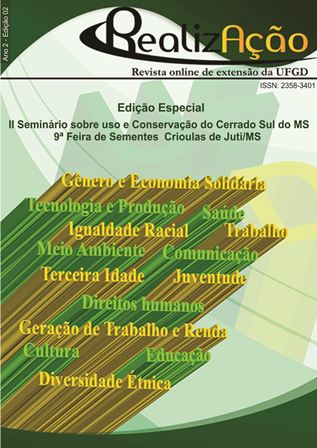Science Teaching through agricultural practices in the vegetable garden at the indigenous school in the Pirajuí village, Paranhos, MS
DOI:
https://doi.org/10.30612/realizacao.v1i2.3279Keywords:
Vegetables , Indigenous community , Environmental educationAbstract
The objective of this study was to implement a vegetable garden in the school space together with the 5th grade students of Early Childhood Education at the Adriano Pires Municipal School, Pirajuí Village, Paranhos, MS. Through this, it was possible to promote healthy eating habits and contribute to the teaching and learning of science. Before building the vegetable garden with the children, an interview was conducted with Mr. Zacarias Recalde, 72 years old, with the aim of seeking information about the types of vegetable gardens that were made by the Guaranis in the past, and finally the construction activities of the vegetable garden began. Through the experience of the vegetable garden at the Adriano Pires Municipal School, it became possible to develop the teaching-learning process, through practice, in addition to awakening social values such as participation, interpersonal relationships, a sense of responsibility and awareness of issues related to the environment. The students were able to analyze and discuss the best ways to maintain a healthy environment, also helping them to take greater care of their diet and hygiene. The school garden allowed them to recover some of the traditional Guarani knowledge, rescuing some species that have rarely been planted in the village, such as the cara.
Downloads
Downloads
Published
How to Cite
Issue
Section
License
Copyright (c) 2014 Monica Monica Benites, Zefa Valdivina Pereira, Andréia Andréia Sangalli, Shaline Séfara Lopes Fernandes, Carla Tais Nevoleti Correia Lima

This work is licensed under a Creative Commons Attribution-NonCommercial-ShareAlike 4.0 International License.
Autores que publicam nesta revista aceitam as normas de publicação, bem como, concordam com os seguintes termos:
(a) O Conselho Editorial se reserva ao direito de efetuar, nos originais, alterações da Língua portuguesa para se manter o padrão culto da língua, respeitando, porém, o estilo dos autores.
(b) Autores mantêm os direitos autorais e concedem à revista o direito de primeira publicação, com o trabalho simultaneamente licenciado sob a Creative Commons Atribuição-NãoComercial-CompartilhaIgual 4.0 Internacional que permite: Compartilhar — copiar e redistribuir o material em qualquer suporte ou formato e Adaptar — remixar, transformar, e criar a partir do material. A Creative Commons Atribuição-NãoComercial-CompartilhaIgual 4.0 Internacional considera os termos seguintes:
- Atribuição — Você deve dar o crédito apropriado, prover um link para a licença e indicar se mudanças foram feitas. Você deve fazê-lo em qualquer circunstância razoável, mas de nenhuma maneira que sugira que o licenciante apoia você ou o seu uso.
- NãoComercial — Você não pode usar o material para fins comerciais.
- CompartilhaIgual — Se você remixar, transformar, ou criar a partir do material, tem de distribuir as suas contribuições sob a mesma licença que o original.
- Sem restrições adicionais — Você não pode aplicar termos jurídicos ou medidas de caráter tecnológico que restrinjam legalmente outros de fazerem algo que a licença permita.


